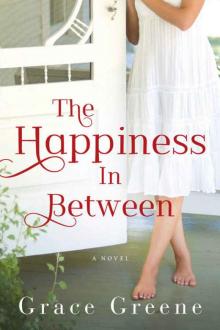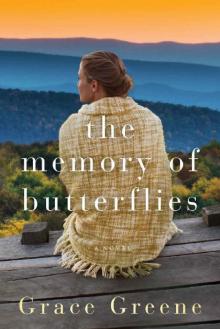- Home
- Grace Greene
The Memory of Butterflies: A Novel Page 13
The Memory of Butterflies: A Novel Read online
Page 13
I pulled into the parking lot but sat in my car. This was too strange. My curiosity warred with sudden anxiety.
With my shoulder bag held tight against my body, I got out of Grand’s car and locked it, then paused to examine the dented front bumper. It was an old dent and looked like it was rusting. I was stalling. I was nervous. I wasn’t accustomed to being nervous, thus it unnerved me further. I blamed Gran for it. Her behavior. Sometimes she could be ornery. Sometimes odd. She was the most loving, but also the most stubborn, person I could ever imagine.
I pushed the door open and went inside.
Aggie smiled and greeted me by name. “Miss Cooper. Welcome back.”
“Yes, ma’am.” I nodded and tried to return her smile, but my jaw felt tight.
“Mr. Browne is expecting you. If you’ll have a seat, I’ll let him know you’re here.”
The waiting area wasn’t fancy but certainly respectable. Last time I hadn’t had to wait. Still, I couldn’t sit. I noted the carpet on the floor, the papered walls, a painting of tall snow-covered mountains and flowered fields hanging over a small loveseat-style sofa. Looked clean. Neat. Reasonable.
My anxiety began to abate a little, but when the office door opened, it ramped back up.
“Hello, Hannah. Nice to see you again.” He extended his hand, and we shook.
I held out the letter. “My grandmother sent this for you.”
“Certainly.” But he didn’t take it. “Would you like coffee? Or water?”
“Nothing for me.”
He turned to Aggie. “Would you bring me some coffee and a bottle of water for Miss Cooper?” He stepped back and motioned me to enter his office ahead of him.
I remembered his manner as being less formal than this. He seemed on edge. I stopped halfway through the doorway.
“Mr. Browne, is there a problem?” I held up the envelope again. “What’s going on?”
“You are very perceptive, Hannah, but don’t worry. This is mostly about business—your grandparents’ business and yours. Your grandmother and I have spoken on the phone. I imagine the letter relates to what she’s already asked me to discuss with you.” He accepted the envelope and put his hand on my arm. “Come into the office, and we’ll talk.”
Aggie was right behind us with his coffee and with water for me. She set them on the desk and left, closing the door behind her.
As before, I settled on the edge of the leather chair facing his desk, but I stayed, tense, with my purse on my lap and my arms wrapped around it. I could read body language and knew how my own posture looked, but I couldn’t help it. Maybe it was good for him to see I wasn’t a fool or someone to be fooled with, but rather someone who could think for herself and wasn’t likely to be taken advantage of.
He used a letter opener to slit the envelope.
I watched as he read. My eyes flitted from his expression to his suit to his perfect, graying hair. I saw nothing to give me alarm. In fact, his eyes seemed kind. My tension eased again.
When he was done reading, he said, “So, it’s been a little more than a year since you were last here. How are you doing? How’s your grandmother?”
“She’s well.”
“I only met her once. Quite a lady.”
“What exactly is your relationship with my grandparents? Why do you manage their financial affairs?”
He nodded. “When we met before we discussed your grandfather. You know I had a lot of respect for him. He didn’t want to be troubled with financial management, but neither was he the kind of man to neglect his responsibilities. His biggest concern was that his family be provided for, now and in the long term.”
I waited.
Mr. Browne leaned back. His tone softened. “After your mother died, I think your grandfather recognized that anything could happen to anyone—something we would all do well to keep in mind—and he knew your grandmother wouldn’t be able to manage in a real-world kind of way.
“As for him, I think he’d lost the heart for it years before. He’d left most of his business affairs in the hands of my father. I joined my father’s practice early in my career and then took it over when he retired. I know how strange this must seem to you, but I feel as if I’ve known your family for many, many years.”
Still, I waited.
“Your grandparents lived simply. Very. They had assets that they’ve drawn on but in a very small way, thus money isn’t an issue. You should know this in case it becomes . . . I’m thinking mostly of your grandmother and her health, but also of your daughter. Life happens whether we’re ready or not.” He reached into a drawer. “Your grandmother called a few days ago and asked me to explain to you the details of the property and the will.”
I hugged my purse harder. I’d known there was a will. Regardless of their financial situation, there was land and the house and outbuildings. I was the only heir. What needed explaining?
He took two documents out of the drawer. One was trifolded. The other was in a fat white envelope. He laid the envelope on his desk and patted it. “You don’t need to do anything about the will. This is a copy for you. It’s very straightforward. You are the sole heir, of course.”
No surprise there. So what was the big deal? Yet clearly something was, because his demeanor became increasingly serious, and as his frown grew, I fought the urge to jump up and run.
He unfolded the other document and laid it on his desk. “This document is a conveyance of property. Your grandmother is conveying the ownership of the land, house, and all outbuildings, et cetera, to you.”
I shook my head. “I’m sorry. I don’t understand. I always knew Cooper’s Hollow would be mine when she passed, but she’s giving it to me now?”
He paused a moment. I could see him thinking. Finally, he said, “Your grandparents added you to all their accounts before your grandfather died. Joint ownership. Your grandmother asked me to change that over to you, as the sole owner where appropriate. Some accounts are payable on death and can stay as is. She asked me to review this information with you.”
I saw the acreage spelled out, and I saw the plat. He showed me the list of accounts—he called it an investment portfolio—and the income from their stocks and bonds. It all whirled around my head. Though I was seated, I gripped the edge of his desk to steady myself.
“You may remember signing documents before your grandfather died?”
“I”—I took a deep breath and tried again—“I remember. He said it was a just-in-case kind of thing. In case something happened to him and Gran. He didn’t say . . .” I ran out of words and stopped.
Mr. Browne continued. “An accountant in Louisa has been doing the state and federal taxes each year, and I ensure those taxes, and other bills, are paid. Unless or until you choose to make a change in our arrangement, I’ll continue seeing that it’s handled. I’m happy to meet with you anytime and review it again, and in more depth. You look overwhelmed.”
“I am, and I’m confused, Mr. Browne. I feel like I’m missing something.” I shook my head again. “We’re poor. We didn’t mind doing without because we had what we needed and more. But this . . . There’s money. I don’t understand.”
“The estate built over the years. As I said, my father managed it before me. In addition to other monies, there were life insurance policies that were paid out and invested.”
“For my grandfather.”
He nodded. “And your parents.” He looked away and cleared his throat, then turned back. “Your grandparents couldn’t bring themselves to spend the money, considering how it came to them. There is something else. Your grandmother asked me to speak with you about your mother and father.”
My mouth was so dry I couldn’t form any words. I picked up the bottle of water and twisted off the cap. I took a few slow sips. The water was cold. Not as good as our well water, but it eased my parched mouth and throat. I closed my eyes and drank a little more.
“She wanted me to tell you about their deaths.”
I
set the bottle back on his desk. “I know about all of that. They died in a car crash soon after I was born. They were on a trip. I know because I asked Grand when I was a child. I wanted to see where the accident happened, and they told me it was a narrow winding road somewhere along the Shenandoah River. They didn’t know exactly where. My grandparents didn’t like to talk about it.”
He shook his head. “I advised them to tell you the truth years ago. My father did, too, before he passed. It’s a wonder you never heard of it from other kids in school or from other sources. Your grandfather wouldn’t tell you without your grandmother’s approval.
“I’m sure she wanted it to come from her and your grandfather. But obviously she can’t do it, and she has asked me to tell you the story.”
He’d urged them to tell me the truth? What truth?
I wanted to leave. How ridiculous would I look if I simply got up and moved toward that closed door? I looked at Mr. Browne, assessing. Was that pity I saw in his eyes?
“Hannah, your father wasn’t from around here. He was new in town, a laborer, picking up work where he could find it, when he met your mother. I never knew either of them, but my father said your mother was a sweet, kind, beautiful young woman. Perhaps she saw his wounded nature, and it drew her in. We’ll never know. I understand he was handsome and courteous. If he hadn’t been, your grandfather would’ve run him off one way or the other, but he had everyone fooled.
“Anne Marie, your mother, stayed at home after high school, and your grandparents assumed she’d fall in love with a local man and marry, but your father wasn’t what they had in mind as good marriage material. They spoke against him and finally, the two eloped. Your grandparents weren’t happy about it, but they accepted it. What else could they do?
“Your grandfather said he behaved well, and your parents were happy until trouble hit. He lost his job, your mother became pregnant, and they moved into the house at Cooper’s Hollow with your grandparents. They said he changed. He accused your mother of seeing other men, looking for someone else because he wasn’t good enough. He insisted people were lying about him, and he threatened to kill her before he’d lose her. They kicked him out. Flat out. Your grandfather leveled his shotgun at him and told him if he came back, he’d have him arrested and shoot him to hold him there until the police arrived.
“Sadly, he did return. It was shortly after you were born. Your grandmother was out in the garden and had you with her. You were napping in a basket nearby. She never knew aught was amiss until she heard the gunshot. Your grandfather said she looked up and stared at the house as if she knew that every bad thing that could ever happen had occurred in that one moment. He was working on a lawn mower repair for someone, and he was up on his feet and running to the house at the sound of the shot. The second shot came as he reached the kitchen door.
“You can imagine the rest. Your father shot your mother and then himself. Mr. Cooper said he and your grandmother stood there realizing their daughter and her husband were dead and then they heard you crying outside in your basket. Your grandfather said your cry was the sweetest sound he ever heard because he knew you were all right, despite the rest.
“There’s no way of knowing if he would’ve shot you, too. Likely not, but gratefully, he didn’t have the chance.” Mr. Browne stared at me, but kindly. “It’s a lot to digest. His name and what little information we have about him is in this folder.”
There was a folder in his hand, and he offered it to me, but I didn’t reach for it.
Where had the folder come from? I hadn’t noticed it. Maybe he’d pulled it out while I was drinking the water? I wanted to think about the cool, fresh water. Nothing else. Not folders or secrets or anything like that.
“Hannah, your grandparents petitioned the court to annul the marriage and change your last name back to Cooper. They didn’t want you to bear your father’s name. I presume you’re in agreement with that, but if you’re not, you can always get it changed back. I can help you with that or anything else.
“This folder has newspaper clippings, too. My father and I kept it all together thinking it might be wanted one day. Maybe wanted is the wrong word. But it’s yours now, to do with as you wish.”
I stared at the water bottle. I drank what was left, so thirsty I felt I’d never be sated again. Then I remembered. My heavy heart lifted. This couldn’t be correct.
“There’s been a mistake here,” I said. “My father is buried in our backyard, in our family plot. The stone says Sean, husband of Anne Marie. It gives the year of their death.” The words were tumbling out one on top of the other, and I tried to stem them but couldn’t. Nearly frantic, I struggled to find the words to refute what he’d said. “There’s some kind of misunderstanding. Gran said they died in a car crash, together.”
Mr. Browne put the folder back onto the desk with the other documents. “Sean Davidson was his name. He isn’t buried there. He was cremated. Your grandfather disposed of the ashes.” He went silent for a few definitive seconds, and then said, “I’m sorry.”
“Is he in the house? The ashes, I mean.” I cringed. The idea horrified me.
“Your grandfather said he poured the ashes into Cub Creek. He said they washed straight down the creek into the South Anna River and then the James. He wanted them scattered and lost forever in the depths of the Atlantic Ocean.”
How long did I sit there? My brain had stopped on forever, and I was having trouble moving forward.
“We should schedule another meeting to go over the financial arrangements and make sure they’re meeting your needs.”
Still struggling, I nodded. I wanted to talk about clothing and shoes for Ellen. Pottery clay. Not about the murder-suicide of my parents. Right there where I lived. This had to be a mistake, my brain insisted.
Then I remembered the boards under the living room rug. Those boards were newer and didn’t match the rest of the flooring. I’d asked him about it once. Grand had muttered something about termites or vermin wrecking the original wood.
Was it strange I hadn’t heard these details before? Perhaps not. New arrivals to town wouldn’t know about it. The longtime residents who knew my family might have gossiped about lesser things, but when it came to such extreme tragedy, they tended to band together in a . . . I groped for the right words. Almost a communal protective stance. Like an unspoken agreement to pretend some things, some truly awful degrading things, had never happened. Some things were not to be spoken of.
Dark currents were morphing and swirling inside me. It was hard to concentrate. I closed my eyes and tried to focus. I’d think about all this other stuff later. I couldn’t deal with it now. Later, it would hurt less. For now, I’d deal with today and this task, this moment.
I opened my eyes and said with forced calm, “I had planned to visit you anyway.”
My voice had cracked. I took a deep breath and tried again.
“Ellen needs things. I do, too. Can you tell me what the arrangement is for the allowance? From the annuity or bank or wherever the money comes from?”
I straightened the strap on my purse. Somehow it had become twisted. I tried to smile but couldn’t manage it.
“Call me or come by when you’re ready to discuss this further. I know it must seem a blur now.”
Mr. Browne opened a drawer and removed a checkbook. “I’ll walk with you over to the bank. This is the account I use as the power of attorney. It’s time we have them set up a checking account for you, with only your name, and transfer money over. You can draw on it as you need it.”
At the bank, the teller smiled when we entered, and the branch manager greeted us and steered us to her office. She gave me starter checks to use while I was waiting for the actual checks.
They gave me cash, too. Several hundred dollars without blinking.
The ease of obtaining the cash, the knowledge I now possessed about my parents—and my own lies, including living as the mother of my beautiful Ellen—all contributed to a sense of
unreality. I wanted to be angry. Cruel, even.
Did that mean I was my father’s daughter? Hannah Davidson? What about the girl, Hannah Cooper, who’d grown up with her grandparents in Cooper’s Hollow, who’d never had much, and had never wanted for anything other than what she had, at least not until high school when she’d wanted to see the outside world, had wanted to go off to college. But hadn’t.
Where was that Hannah? Who was she?
That girl, that Hannah, had stayed home for her Gran, had cleaned houses to earn cash. If I’d known the truth, what would’ve been different? For one thing, I would never have been put in the position of running into Spencer in his kitchen that day and all that came from that.
Yet who could say what else, what good things, might never have happened if I’d lived my life differently?
On the drive home, I pulled off into the lumberyard parking lot. There were enough cars in the lot that mine didn’t stand out, but everyone was in the building or the fenced yard working, so I had privacy. The manila folder lay on the seat beside me. I didn’t remember picking it up and taking it with me. But here it was. I reached for it.
With great caution, I opened the folder. The headline was stark. It read SMALL-TOWN TRAGEDY. The black ink was fading. The newsprint was old. Twenty years old. It felt brittle. I read through each news clipping in turn and returned them to the folder. I learned nothing new. Mr. Browne had been correct in his telling of the story. I drove home, but I didn’t remember the trip. Everything I had learned, both about the truth and the lies—a lifetime of lies—had dredged up resentments I never knew I harbored.
My grandparents, the mainstays of my world as I knew it, the people I trusted as I trusted no one else in the universe, had kept this from me. Even the bare, basic fact of my father’s empty grave. Gran had known all these years, and she’d let me go on in ignorance. I had to confront her. This was unacceptable.
But.
A big but. It occurred to me that I hadn’t been the first to deceive, but I had embraced my own deceptions. Sweet Ellen’s father’s grave was also empty. For the purpose of saving questions. Of solving potential ugliness and keeping it from intruding in our lives.

 Wildflower Hope (The Wildflower House)
Wildflower Hope (The Wildflower House) The Happiness in Between
The Happiness in Between The Memory of Butterflies: A Novel
The Memory of Butterflies: A Novel Clair (Beach Brides Book 4)
Clair (Beach Brides Book 4)